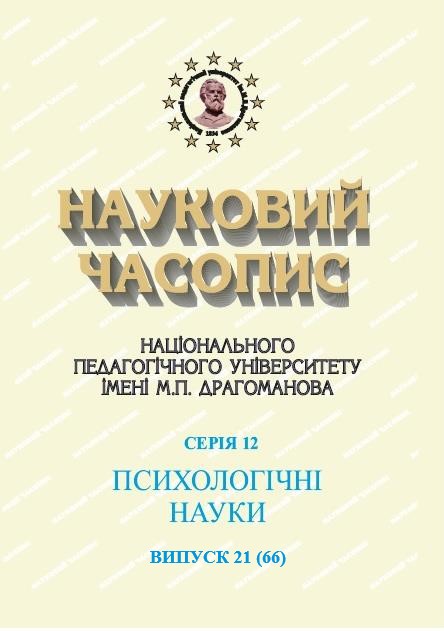PERSONALITY RESILIENCE AND YOUNG PEOPLE’S DYSFUNCTIONAL ATTITIDES
DOI:
https://doi.org/10.31392/NPU-nc.series12.2023.21(66).08Keywords:
hardiness, commitment, control, challenge, dysfunctional attitudes, first year students.Abstract
The article is focused on highlighting the psychological features of students’ resilience development. The concept of resilience is viewed as a personality resource that allows to effectively resist life difficulties and threats while preserving one’s psychological wellbeing. The assumption is made that the barrier for the young people to fully develop their resilience is the dysfunctional attitudes. Those cognitive schemes acquired in childhood appear to be the source of negative emotions and permanent stress and show the vector opposite to resilience attitudes. The article presents the results of the empiric study of the correlation between first-year-students' attitudes of resilience and their dysfunctional cognitive schemes. It has been found that in the majority of cases sufficiently developed resilience is combined with the absence of manifested negative dysfunctional attitudes. The exception are the students who have low level indexes of all the resilience attitudes: they demonstrate all types of distinctly shown negative cognitive schemes. Installed that the mostly manifested correlation is between the resilience and the dysfunctional attitude “Approval”: the more one is independent of other people’s opinion, the better their commitment, control and challenge are manifested. Instead one’s emotional wellbeing dependency from other people’s opinion activates protective behavior patterns of avoidance, which contradicts the content of the hardiness attitudes. Low level indexes of resilience evidently correlates with: a) one’s predisposition to play passive and humiliated role because of one’s fear to be alienated (dysfunctional attitude “Attachment”); b) one’s striving to control other people’s behavior to prevent the situations when they can be disappointed or angry with them (“Omnipotence”); c) one’s attempts to achieve high self-esteem and self satisfaction via increasing their productivity (“Achievement”); d) one’s striving to look, think and behave ideally with no permission to make mistakes or fail (“Perfectionism”). The data analysis allows to assume that dysfunctional attitudes can be the obstacle for the definite resilience attitudes development. The attitude “commitment” can be prevented from development by the cognitive schemes “Achievement” and “Perfectionism”, the attitude “control”– the schemes “Approval” and “Omnipotence”, the attitude “challenge” – the schemes “Approval” and “Attachment”. The results of the research can be used to build up a program of the students’ resilience development via bringing to consciousness their active dysfunctional attitudes.
References
- Avramchuk O., Kopchuk-Kashetskyi, O., & Zubachyk, H. (2021). Akademichne vyhorannia sered studentiv: rol rannikh dysfunktsiinykh skhem yak faktoru vrazlyvosti [Academic burnout amongst students the role of early maladaptive schemas as vulnerability factor]. Visnyk Lvivskoho universytetu. Seriia psykholohichni nauky – Bulletin of the University of Lviv. Psychological Sciences Series, 9, 3–13. https://doi.org/10.30970/PS.2021.9.1 [inUkrainian].
- Kiosieva, O.V. (2016). Osoblyvosti zhyttiestiikosti studentiv molodshykh kursiv z rozladamy adaptatsii [Characteristics of hardiness of undergraduate students with the adjustment disorder]. Ukrainskyi visnyk psykhonevrolohii – Ukrainian Bulletin of Psychoneurology. 24, 3(88), 55–61. Retrieved from http://uvnpn.com.ua/upload/iblock/35f/35f7f
e6db60f2045f
78115434e604836.pdf [inUkrainian]. - Serdiuk, L.Z., & Kuprieieva, O.I. (2017). Psykholohichni zasady pidvyshchennia zhyttiestiikosti osobystosti [The psychological bases for personal hardinessincreasing]. Aktualni problemy psykholohii. Zbirnyk naukovykh prats Instytutu psykholohii imeni H.S. Kostiuka NAPN Ukrainy Psykholohiia osobystosti. Psykholohichna dopomoha osobystosti – Actual problems of psychology. Collection of scientific papers of the G.S. Kostyuk Institute of Psychology of the National Academy of Pedagogical Sciences of Ukraine Psychology of personality. Psychological assistance to the individual, XI(15),481–491. Retrieved from https://lib.iitta.gov.ua/709097/
1/%D0%A1%D0%B5%D1%80%D0%B4%D1%8E%D0%BA%20%D0%9B.pdf [inUkrainian]. - Chykhantsova, O.A. (2018). Zhyttiestiikist ta yii zviazok z tsinnostiamy osobystosti [Hardiness and its relationshipwith the values of the personality]. Problemy suchasnoi psykholohii. Zbirnyk naukovykh prats Kamianets-Podilskoho natsionalnoho universytetu imeni Ivana Ohiienka, Instytutu psykholohii imeni H.S. Kostiuka NAPN Ukrainy – Problems of modern psychology. Collection of scientific papers of Kamianets-Podilsky Ivan Ohienko National University, G.S. Kostyuk Institute of Psychology of NAPS of Ukraine, 42,211– S.D. Maksymenko, L.A. Onufriieva (Eds.). https://doi.org/10.32626/2227-6246.2018-42.211-231 [in Ukrainian].
- Balkis, M. (2013). Academic procrastination, academic life satisfaction and academic achievement: The mediation role of rational beliefs about studying. Journal of Cognitive and Behavioral Psychotherapies, 13(1), 57–74. Режим доступу: https://www.researchgate.
net/publication/236173872_Academic_procrastination_academic_life_
satisfaction_and_academic_achievement_The_mediation_role_of_
rational_beliefs_about_studying - Beck, A.T. (2002). Cognitive models of depression. Clinical advances in cognitive psychotherapy: Theory and application, 14(1), 29–61.
- Judkins, J.L., Moore, B.A., & Collette, T. (2022). Psychological Hardiness. Psychology in the Real World. (pp. 2-14).Abingdon, Oxon : Routledge. https://doi.org/10.4324/9780367198459-REPRW120-1
- Kınık, Ö, & Odacı, H. (2020). Effects of dysfunctiona lattitudes and depression on academic procrastination: doesself-esteem have amedia tingrole? British Journal of Guidance & Counselling, 48(5),638–649. https://doi.org/10.1080/03069885.2020.1780564
- Kobasa, S.C., Maddi, S.R., & Kahn, S. (1982). Hardiness and health: a prospective study. Journal of personality and social psychology, 42(1), 168–177. https://doi.org/10.1037/0022-3514.42.1.168
- Maddi, S.R. (2020). Resiliency and Hardiness. The Wiley Encyclopedia of Personality and Individual Differences: Clinical, Applied, and Cross‐Cultural Research, 393–398. https://doi.org/10.1002/9781118970843.ch330
- Maddi, S. (2007). Relevance of Hardiness Assessment and Training to the Military Context. Military Psychology, 19(1),61–70. https://doi.org/10.1080/08995600701323301
- Maddi, S. (2006). Hardiness: The courage to grow from stresses. The Journal of Positive Psychology, 1(3),160–168. https://doi.org/10.1080/17439760600619609

